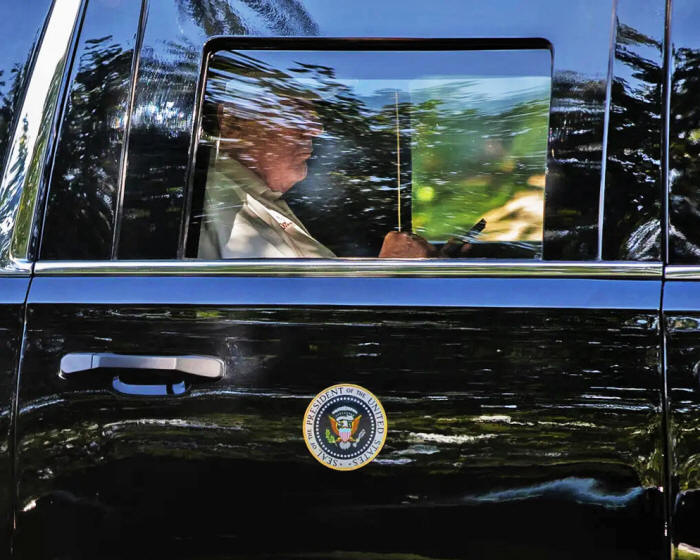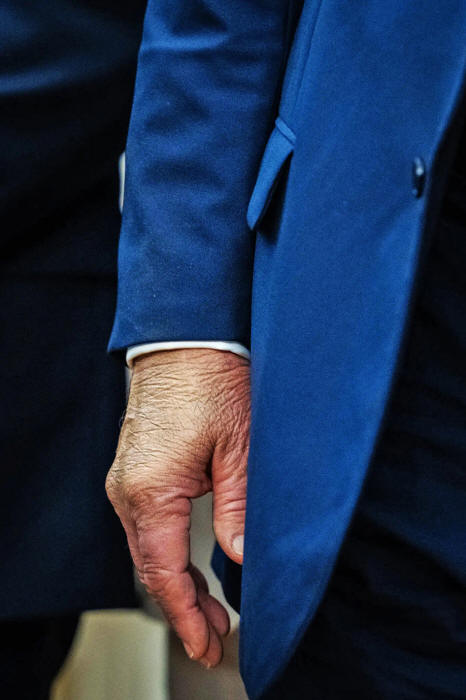|

by
Katie Rogers
September 02, 2025
from
TheNewYorkTimes Website
Article also HERE

President Trump was seen looking at his cellphone
as he departed his
golf club in Virginia on Sunday.
Credit: Anna Rose Layden for The
New York Time
In the world of presidential health,
distrust and speculation run so
rampant
that even Mr. Trump's online
assurance that he was fine
was
immediately explained away
as part of a cover-up...
President
Trump had nothing on his public schedule for three days
last week.
He is often sporting a large, purple bruise on his right
hand, which he sometimes slathers with makeup.
His ankles are
swollen.
He is the oldest person to be elected president.
For a swath of hyper-online Americans over the long Labor Day
weekend, all of this was explanation enough:
The president was
either dead or about to be...
Mr. Trump's critics,
have speculated about his health for as long as
he has been in national politics.
And for his part, he has long
declined to explain when and why he has sought out medical care,
whether he was suffering from Covid or undergoing routine
procedures.
But there had never been a conspiracy wave as feverish
as this one.
On TikTok, influencers with
legions of 'followers' surmised that
the White House was publishing old photos, suggesting that the
president was being hidden from view.
Reddit threads, one after
another, were ablaze with commentary.
On X, posts shared by
anonymous critics disseminating dubious reports picked up thousands
of interactions and shares.
There was so much conversation around the president's absence that
Mr. Trump was asked to weigh in on Tuesday, at his first official
public appearance in a week.
When asked by a reporter how he first
learned that he was dead, Mr. Trump said that he was not aware of
the rumors that he had died.
Then he started speaking about those
rumors at length, saying he had done media appearances, gone golfing
at his Virginia club and posted prolifically on his social media
site.
"I did numerous shows, and also did a number of Truths," Mr. Trump
said during an appearance in the Oval Office, referring to his
social media site, where he posted over 90 times between Saturday
and Monday.
"I think, pretty poignant Truths. I was very
active over the weekend."
Welcome to the modern, conspiracy-fueled world of
presidential health, where distrust and speculation run so rampant
that even Mr. Trump's online assurance that he was fine earlier this
weekend,
"NEVER FELT BETTER IN MY LIFE!" he wrote on Sunday,
...was
immediately explained away as part of a cover-up...
The focus on the health of an aging president seems inevitable after
the nation's experience with Mr. Trump's predecessor,
Joseph R.
Biden Jr., who
physically declined in public,
though his aides attacked those who questioned what they were
seeing.
Mr. Trump made Mr. Biden's fitness for office a foundation
of his 2024 campaign, even after Mr. Biden dropped out of the race...
Adding to the problem is a longtime presidential
tendency to not disclose a full picture of health.
Although Mr.
Trump has obscured the truth about his health before, this is not
unique to him.
President Woodrow Wilson had a stroke and was hidden
from public view.
President Franklin D. Roosevelt was wheelchair
bound, but few Americans at the time ever saw him in one.
President
John F. Kennedy suffered from chronic back pain but was held up as
the picture of health.
For years, justifiable concerns and questions
about Mr. Trump's health have often been met with obfuscation or
minimal explanation from the people around him.
Mr. Trump's
physicians have not taken questions from reporters in years, and
there were no medical briefings held after an
assassination attempt
against him in Butler, Pa., last summer.

Makeup was seen on President Trump's right hand
as he made an announcement in the Oval Office on Tuesday.
Credit: Haiyun
Jiang/The New York Times
Distrust and speculation surrounding Mr. Trump's
health goes back to his first term.
In 2018, Mr. Trump's longtime physician, Dr.
Harold N. Bornstein, accused two Trump aides of
staging what he called "a raid"
of his Manhattan office in February 2017 and removing all of Mr.
Trump's medical files.
That month, Dr. Bornstein had given a lengthy interview to The
Times and had disclosed the medications Mr. Trump was taking:
antibiotics to control rosacea, a statin for
elevated blood cholesterol and lipids, and finasteride, a
prostate-related drug to promote hair growth.
Dr. Bornstein, who died in 2021, also said that
Mr. Trump, rumored to be a germaphobe,
"changes the paper on the table himself"
after examinations.
At the time, Mr. Trump's press secretary,
Sarah Huckabee Sanders, said aides had taken the files as part
of a standard transition measure.
Questions continued to circulate after Mr. Trump
made an unexplained and unannounced visit to Walter Reed National
Military Medical Center in November 2019.
(In 2021, his former press secretary,
Stephanie Grisham, wrote in a memoir that Mr. Trump had
undergone a routine colonoscopy.)
Questions were raised again in June 2020 when Mr. Trump
gingerly navigated a ramp at a West Point
graduation and appeared to have trouble raising a
drinking glass:
When Mr. Trump had 'Covid'
(meaning 'a
cold'...) in October 2020, he was
sicker than anyone around him had publicly revealed at the time.
"There's always been this wishful-thinking
industry around Trump's health and Trump's legal woes," said
Mike Rothschild, a journalist and
author who studies conspiracy
movements.
"There's been this far-left influencer sphere
that is constantly pumping up the idea that Trump is about to go
to prison or the walls are closing in."
As with many conspiracy theories, this
latest one about Mr. Trump's health carries a kernel of truth:
He is old...
At the end of his second term, he would be 82
years old, and months older than Mr. Biden was when he left office.
In interviews and public events, Mr. Trump often asks for questions
to be repeated so he can hear.
"Say it?" he asks when he needs something to
be said again.
Mr. Trump prefers to hold events in the Oval
Office rather than in larger venues like the East Room, in part
because the acoustics are better and he is not forced to stand for
long periods, according to a person familiar with event planning at
the White House.
Mr. Trump, 79, also has a
history of high cholesterol.
According to his most recent health disclosure
sent in April by his White House physician, Dr. Sean P.
Barbabella, Mr. Trump takes two medications,
Crestor and Zetia, to lower his LDL
cholesterol levels.
In 2018, Mr. Trump's White House physician at the
time, Dr. Ronny L. Jackson, said Mr. Trump was in "excellent"
health, but noted that the president's LDL levels were listed at
143, well above the desired level of 100 or less, despite taking
Crestor.
This year, Dr. Barbabella listed them at 51.
David J. Maron, a cardiologist at Stanford University
School of Medicine who has not treated Mr. Trump, said that such
a drop could be attributed to an "extraordinary" response to Zetia -
an outcome he said was unlikely - and to a higher dose of Crestor.
A better diet and lifestyle changes could also help, though Mr.
Trump, who is overweight, still maintains a diet heavy in fast food,
including McDonald's.
Dr. Eric Topol, a cardiologist and founder
of the Scripps Research Translational Institute, said it was
"not possible" to drop to such a low LDL level by adding Zetia
alone.
Mr. Trump also takes aspirin to reduce the risk of cardiac problems.
White House officials, including Dr.
Barbabella, have said that the aspirin is the cause of the large
bruise on Mr. Trump's right hand, and that the bruising comes
and goes based on how many hands Mr. Trump has been shaking.
The president tends to dab makeup on the
bruise that is a shade lighter than his skin tone, making the
cover-up more conspicuous.
Aspirin is not recommended as a preventative medication for
people over 70, and taking it to prevent strokes or heart
attacks could do more harm than good, according to the American
Heart Association.
Exceptions would include patients who have
already had a heart attack, according to Peter Libby, a
cardiologist at Harvard.
Several physicians who have not treated Mr. Trump
say that it is possible for aspirin to cause bruising.
"Bruising on the back of the hand of an older
adult is common," said Dr. Samuel C. Durso, the director
of the department of medicine at Johns Hopkins Bayview Medical
Center.
"Especially if that person, a golfer with
solar skin damage, takes aspirin."
Dr. Durso and other physicians said that the
White House explanation for Mr. Trump's swollen ankles - the
result of chronic venous insufficiency,
a condition that occurs when veins have trouble moving blood back to
the heart, Dr. Barbabella said in July - is possible.
Others were skeptical of the White House explanation for the swollen
ankles.
Dr. Daniel J. Rader, a cardiologist at the
University of Pennsylvania, said venous insufficiency, or
varicose veins, does not cause major swelling and "almost never"
causes it in both ankles, as was seen with Mr. Trump.
The White House has not said whether officials would have Dr.
Barbabella answer questions from reporters, as Dr. Jackson last did
in 2018.
In a statement, Karoline Leavitt, the
White House press secretary, said that,
Mr. Trump was "perfectly fine" and had a
"tremendous" amount of energy.
"He has been completely transparent about his health with the
public," Ms. Leavitt said in a statement, "unlike his
predecessor"...
|



